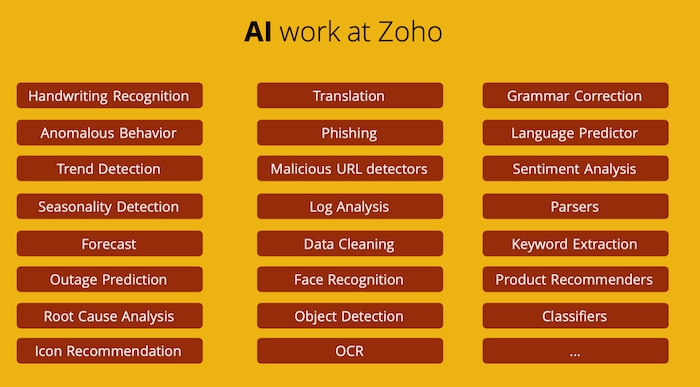 During an intensive day-and-a-half overview for analysts, Zoho’s top executives were joined by product managers, salespeople and customers. Collectively they provided perspective and insights into the company’s history, services, sales momentum, positioning and strategic roadmap. In the midst of such an intensive narrative, it is easy to lose sight of what’s important.
During an intensive day-and-a-half overview for analysts, Zoho’s top executives were joined by product managers, salespeople and customers. Collectively they provided perspective and insights into the company’s history, services, sales momentum, positioning and strategic roadmap. In the midst of such an intensive narrative, it is easy to lose sight of what’s important.
The event vividly dramatized a tenet that Opus Research articulated when defining the idea of Conversational Commerce. “Intelligent Assistance” (IA) is the consumption model for Artificial Intelligence (AI). It is how the people in the finance department, sales office, contact center, factory floor or warehouse will easily and routinely avail themselves of resources that improve the quality of their work and make them more productive.
Upon reflection, Zoho’s “Analyst Day” provided nothing short of a throw-down to the leading providers of cloud-based software suites, starting with productivity, CRM, accounting, email and culminating with virtually every other resource offered now, and in the future, by Microsoft, Google, Salesforce and the growing teems of global XaaS providers. Since its founding in 1996, Zoho has been “the cloud service provider that could…”. It could offer productivity tools and applications that were priced to be attractive to cost-conscious individuals in small-to-mediium enterprises (SMEs) around the world.
From the beginning, Zoho’s founders stayed true to a vision. All software and services are home-grown, developed initially by well-trained developers at the company’s headquarters in rural India. Based on these in-house resources, the company now owns and offer a “full-stack” of solutions residing in their own cloud. At the lower layers, the Zoho cloud is comprised of its own data centers. Networking is provided through a group of 80+ domestic and international carriers who participate in the Zoho PhoneBridge.
Supporting “IA”: Both “Intelligent Assistance” and “Intelligence Augmentation”
Zoho deserves tremendous credit for investing in ways to infuse all of its popular apps, as well as the activities of its users with elements of “artificial intelligence” (AI). This was dramatized very effectively by Dylan Mahood and Victoria Jones during an overview and demonstration on Day 2 of the gathering. Dylan summarized the theme of his talk as an “AI Showcase” featuring the breadth, depth and integration of multiple elements of AI in the Zoho solution stack. Along with Victoria’s use cases, it was really a clinic in Intelligent Assistance, or what Opus Research has repeatedly called “the consumption model for mere humans to make use of Artificial Intelligence.”
The slide below is from Dylan’s presentation. It is a partial listing of the elements of AI that Zoho has incorporated into its offering. As the product of over 10 years of internal development, the portfolio of capabilities is illustrated below in an almost random order. Handwriting recognition, language detection, translation and optical character recognition (OCR) will clearly improve the quality of communication and transaction processing throughout an internationally dispersed company. Translation, for example, now includes 90 identifiable languages, fourteen of which are part of “translatable” language pairs.

Trend-detection, forecasting, root cause analysis and seasonality detection greatly improve planning. Anomalous behavior, Phishing, malicious URL detection and face recognition can augment a companies security resources and promote personalization. This is especially powerful when embedded in Zoho’s solution stack because its approach to data management is especially conducive to traditional data “silos” (inventory status, customer leads, employee profiles, financial data…) as interconnected “Data Pillars” that can be incorporated into responses to employee generated queries.
Expect A Higher Profile for Zia Search
The ability for employees to use their own words to initiate a search that involves multiple databases as well as publicly available information on the World Wide Web was subtly demonstrated on Day One in the course of a product demo of a unified client portal that is part of ZohoOne. With more than 35 applications incorporated into the ZohoOne Suite, customers requests are turning to simplicity and nothing addresses the challenges of making complex processes simple than a well-designed Intelligent Assistant that combines Natural Language Understanding, Analytics, Forecasting and Reporting.
Zoho is now brining the power of natural language search “behind the firewall” in the form of Zia Search. According to Raju, Zoho customers are already generating something on the order of 16 million search/requests per day. This, in turn, gives rise to about 150 million indexing jobs daily. Adding intranet searches to the mix will increase the frequency of use and the intrinsic value of the search utility. By Zoho’s estimate “if you’d this sort of enterprise search using the analogous features/functions on Amazon Web Service, it would cost a company $10 million annually.”
It is offered at no extra charge to users of Zia Search on Zoho One.
Four Cheers For Privacy Protection
Sridhar Vembu highlighted another major differentiator for Zoho when he said flatly that the company’s suite of marketing services would no longer support the use of third-party data. He is drawing a bright line between Zoho’s service offerings in the CRM and Marketing domain from those offered by cloud-based service providers, specifically Google or Amazon, that derive revenues from exploiting personal data.
This approach burnishes Zoho’s reputation for foresight. It is considered extremely risky because it puts its own concern over protecting individuals’ privacy ahead of the concerns of SMEs and larger companies who regard the personal information they have aggregated on their own customers as a source of competitive advantage. Here’s where it helps to recall that the company has been “profitable of day one” by operating its own “private cloud” and without relying on revenues arising from aggregating personal information.
Its business model is substantively different from major rivals, especially Google and Amazon. Its long-standing investment in specific elements of AI, interconnected data pillars, and natural language search is ready-made to support a “less is more” approach to obtaining and storing personal information for analysis. This approach will play better in an era when regulations like the General Data Privacy Regulation (GDPR) sharpen their teeth and lead to significant fines. Zoho is rising to the first-order challenge of helping its clients’ employees discover how much they can do with the information they already have inside their firewall. They can turn “first-person data” (meaning data obtained directly and explicitly from customers or prospects) into competitive advantage that is every bit as formidable as the status quo.
Its top management and founders see the approach as a mere extension of the practices that have made them profitable from the beginning. Only time will tell, but clearly they’re on to something.
Categories: Conversational Intelligence, Intelligent Assistants, Intelligent Authentication, Articles, Mobile + Location

 Opus Research Welcomes Ian Jacobs as VP and Lead Analyst
Opus Research Welcomes Ian Jacobs as VP and Lead Analyst  United Airlines, TXU Energy, and Memorial Hermann Among Opus Research’s 2024 Conversational AI Award Winners
United Airlines, TXU Energy, and Memorial Hermann Among Opus Research’s 2024 Conversational AI Award Winners  Opus Research “Vendors That Matter” Series: Marchex
Opus Research “Vendors That Matter” Series: Marchex  Webinar: “How Conversational Intelligence Drives Better Business Outcomes”
Webinar: “How Conversational Intelligence Drives Better Business Outcomes”